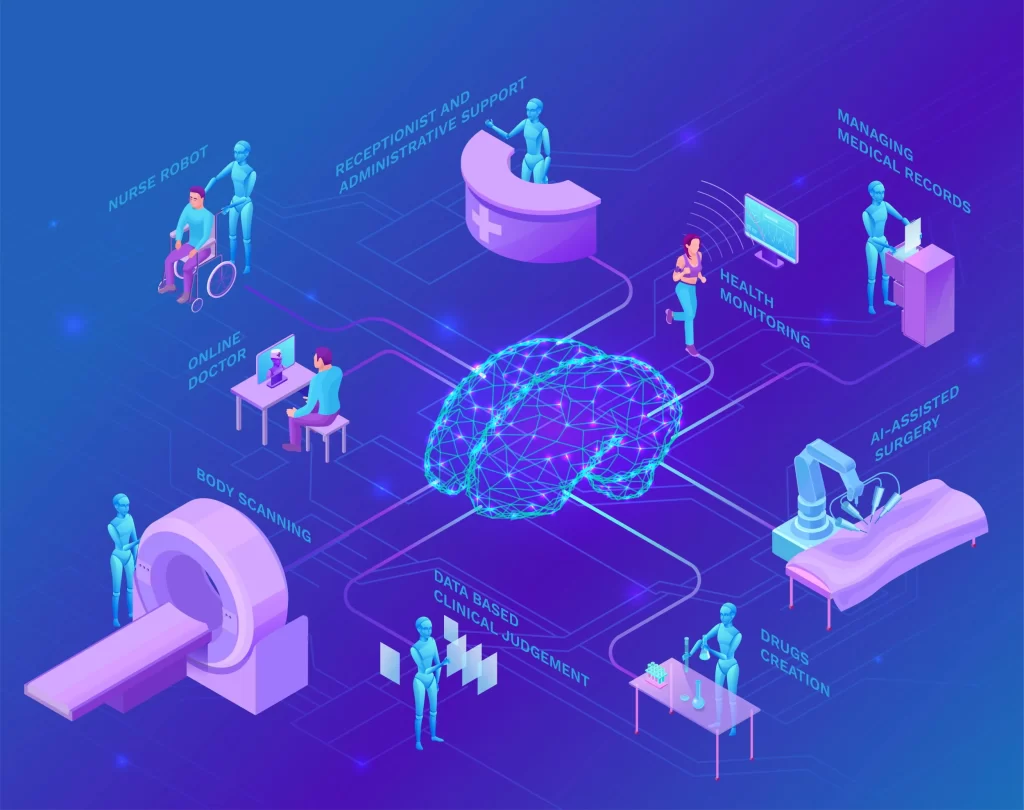Artificial intelligence has many capabilities that have been proven to enhance efficiency in multiple sectors. However, one more unconventional sector that is benefiting from AI is healthcare. Artificial intelligence has the potential to change how doctors diagnose, treat, and oversee patient care, all of which can revolutionize healthcare. Artificial intelligence is transforming healthcare due to its ability to analyze large amounts of data, identify complex patterns, and make precise predictions. If executed properly, these advancements will ultimately result in better patient outcomes, lower costs, and more operational efficiency.
AI can examine medical charts such as X-rays, MRIs, CT scans, and histopathology slides. Moreover, it can aid in illness diagnosis and prediction. Take for example, situations like cancer, cardiovascular diseases, and neurological disorders, where the discovery of minor irregularities can dramatically impact patient outcomes, this rigorous analysis not only improves diagnostic accuracy but also permits early detection.
Furthermore, AI can utilize patient-specific data (such as genetics, medical history, and treatment outcomes) to create personalized therapeutic strategies. By ensuring that patients receive interventions tailored to their individual needs, this ensures improved efficiency in healthcare. Combining these skills offers a positive image of AI’s ability to transform healthcare and improve patient outcomes and satisfaction.
Although the application of AI to the healthcare industry is promising, its integration and application bring about moral dilemmas that will have to be addressed. Data security and privacy are at the forefront of these problems. To solve this, having strong data privacy and security measures in place are crucial. There are also concerns with prejudice embedded within AI algorithms, which are trained on datasets that can contain severe bias and discrimination. This raises doubt about whether AI will be able to sufficiently serve all patient groups in a respectful and equitable way.
The application of AI in healthcare promises greater effectiveness, precision, and individualization of treatment, marking a paradigm shift in the industry. Artificial intelligence-powered technologies have the potential to help healthcare providers make more informed decisions, provide better patient care, and streamline administrative procedures. While the ethical issues regarding the use of AI in healthcare will have to be addressed, we cannot deny the potential that AI yields.
Works Cited
Bajwa, Junaid et al. “Artificial intelligence in healthcare: transforming the practice of medicine.” Future healthcare journal vol. 8,2 (2021): e188-e194. doi:10.7861/fhj.2021-0095
Kriwet, Carla. “Here Are 3 Ways AI Will Change Healthcare by 2030.” World Economic Forum, 7 Jan. 2020, www.weforum.org/agenda/2020/01/future-of-artificial-intelligence-healthcare-delivery/.
U. S. Government Accountability Office. “Artificial Intelligence in Health Care: Benefits and Challenges of Technologies to Augment Patient Care.” Www.gao.gov, 30 Nov. 2020, www.gao.gov/products/gao-21-7sp.
